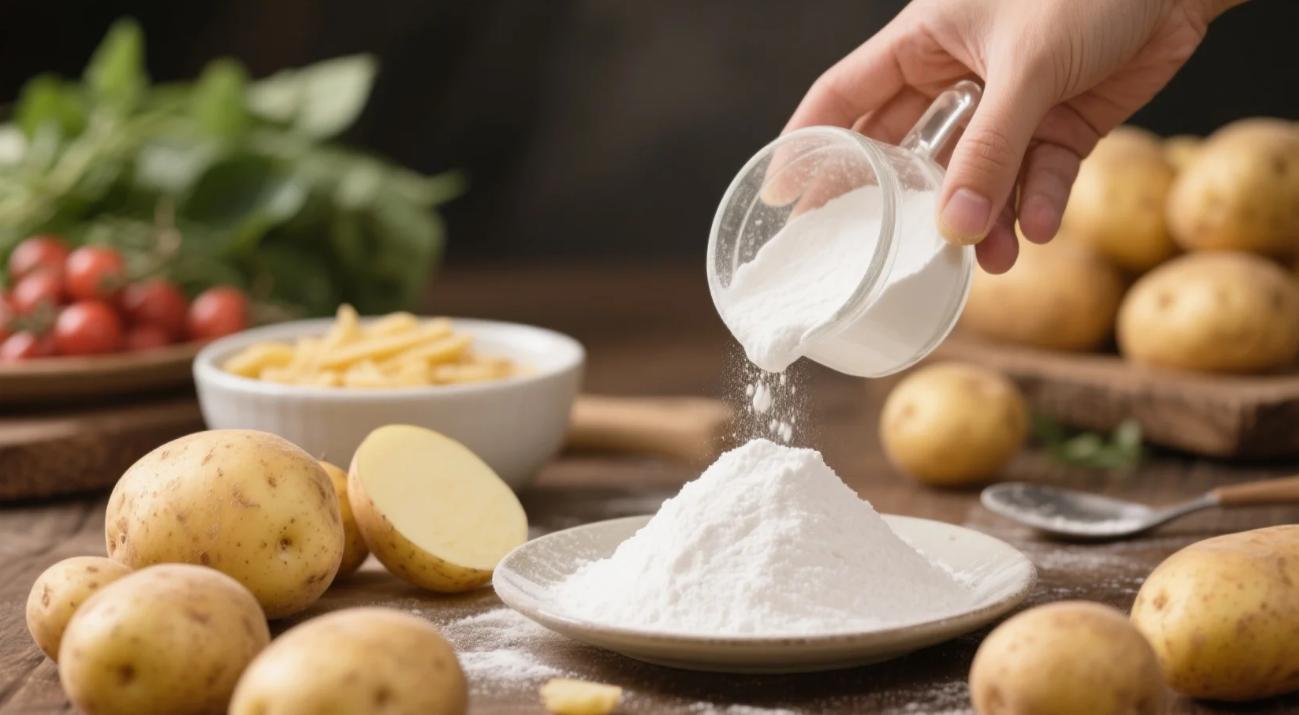Table of Contents
Organic potato starch powder brings unparalleled crispiness and silky textures to cooking, but what if you’ve run out? Don’t compromise results. Discover science-backed swaps that replicate its neutral taste, glossy finish, and 30% higher resistant starch—without gums or fillers.
Why Organic Potato Starch Is Unique
(The Void You’re Filling)
Unlike common starches, organic potato starch powder:
- Thickens at lower temps (ideal for delicate sauces)
- Resists graininess in frozen desserts
- Boosts gut flora via prebiotic resistant starch (7g per tbsp)
Conventional substitutes often use chemical bleaching—destroying nutritional value (Food Chemistry Journal).
5 Emergency Substitutes
(When Dinner Hangs in the Balance)
| Best For | Top Organic Substitute | Ratio | Pro Adjustment |
|---|---|---|---|
| Frying/Crisping | Organic arrowroot powder | 1:1 | Mix 1:1 with rice flour → extra crunch |
| Sauces/Gravies | Organic tapioca flour | 2:1 | Whisk with cold liquid first → no clumps |
| Gluten-Free Baking | Organic cassava flour | 1.5:1 | Add 1 tsp psyllium husk → mimics stretch |
| Dairy-Free Pudings | Organic kudzu root starch | 3:4 | Dissolve in apple juice → sets faster |
| All-Purpose Thickening | Organic green banana flour | 1:1 | Reduce heat → activates at 140°F (60°C) |
Critical Note: Non-organic arrowroot often contains added sulphites—trigger histamine reactions.
For Health Goals: Nutrient-Matched Alternatives
- Prebiotic Fiber Needs → Organic unmodified corn starch
(Choose non-GMO verified: contains 6g resistant starch per tbsp)
Ratio: 1:1 - Low-Glycemic Baking → Organic tiger nut flour
(Soluble fiber replaces 80% of starch’s glycemic load)
Ratio: 1.25:1 - Mineral Boost → Organic sweet potato starch
(Higher potassium/magnesium; thickens slower)
Ratio: 1:1
What To AVOID
⚠️ Wheat flour: Requires 2× more → creates pasty textures
⚠️ Instant tapioca: Leaves rubbery “fish eyes” in liquids
⚠️ Cornstarch (conventional): Made with GMO corn + chlorine dioxide gas
Make Your Own Organic Potato Starch
(More Nutritious Than Commercial)
- Grate organic potatoes → soak in cold water 1 hour
- Strain pulp → let starch settle 30 mins
- Dehydrate at 115°F (46°C) → grind → sieve
Yield: 1 lb potatoes = 3 tbsp pure starch
Shelf-Life Trick: Add 1% organic rosemary extract → prevents oxidation.
The Organic Certification Edge
Conventional potato starch risks:
- Glycoalkaloid toxins: Sprouting potatoes concentrate solanine (avoided in organic farming)
- Pesticide residues: Chlorpropham disrupts gut microbiome
- Anti-caking agents: Aluminum silicate reduces mineral absorption
Rescue Hacks for Specific Disasters
- Grainy Sauce? → Whisk in 1 tsp organic kudzu starch → strain
- Soggy Frying? → Recoat with organic arrowroot powder + nutritional yeast
- Cracked GF Bread? → Replace 25% starch with organic psyllium husk gel
Final Cheat Sheet
Match substitutes to priorities:
- Crispiness → Organic arrowroot
- Gut Health → Organic green banana flour
- Clear Sauces → Organic kudzu starch
DIY Purity Test:
Mix 1 tsp substitute with 2 tbsp cold water. Organic potato starch powder forms slow-settling milky liquid. If your substitute mimics this exactly, it’ll perform like the real deal. That quiet suspension? Your gravy’s future silkiness waiting to shine.
Remember: The best substitute honors two promises—to your recipe’s integrity and your body’s wellbeing. Organic swaps turn kitchen crises into discoveries.
Related Products
Organic Potato Starch Powder
A high-viscosity, gluten-free thickener delivering exceptional clarity and binding power. Perfect for…
Organic Cornstarch Powder
A premium, non-GMO, and gluten-free thickening agent. It provides superior texture and…
